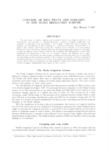The promotion of double cropping and associated increase in cropping intensity, the introduction and adoption of nitrogen-responsive varieties, increased application and quantities of fertilizer, have contributed to the increase of padi yield and production. In addition, the introduction of direct seeding as a cultivation technique characterized by a greater plant density and dense canopy has resulted in the creation of an environment conducive to pest and disease build-up affecting and destabilizing padi production. Strategies for pest and disease control adopted combine the Integrated Pest Management system which emphasizes the importance of the use of resistant varieties, the judicious use of agrochemicals, pest surveillance and forecasting, rescheduling of planting activities to utilize fully the prevailing weather conditions peculiar to the scheme area, and the continuous training of and demonstrations to farmers of the virtues of acceptance and adherence to concerted efforts in pest control. Farmer acceptance and knowledge have been greatly enhanced and the pest control strategies implemented have begun to show results.

